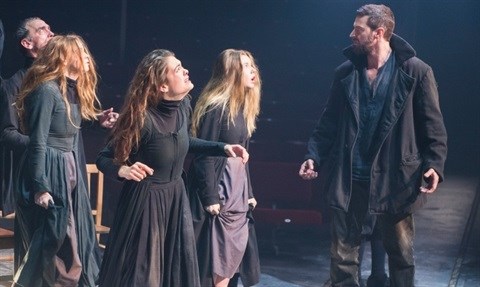
Top stories





Energy & MiningGlencore's Astron Energy gears up with new tanker amidst Sars dispute
Wendell Roelf 11 hours

More news



















Logistics & Transport
Uganda plans new rail link to Tanzania for mineral export boost








Arthur Miller's timeless classic offers theatre at its most commanding, ripping into the fabric of humanity with its relentless persecution of women during Salem's infamous witch trials, and the ardent passion of one man's determination to save himself and his wife from wrongful allegations.
The play is set in a small, tight-knit community in Salem, Massachusetts, in 1692, where personal grievances collide with lust and superstition, fuelling widespread hysteria.
In 17th-century colonial North America, the supernatural was considered part of everyday life; many people believed that Satan was present and active on Earth. This concept emerged in Europe during the 15th century and spread with the later colonisation of North America. Peasants used a kind of witchcraft to invoke particular charms for farming and agriculture. Over time, the idea of white magic transformed into dark magic and became associated with demons and evil spirits. From 1560 to 1670, witchcraft persecutions became common as superstitions became associated with The Devil.

Miller's play, written in 1953, is a dramatised and partially fictionalised story of the Salem witch trials that took place in the Province of Massachusetts Bay during 1692 and 1693.
The play was intensely personal to Miller, who himself was questioned by the House of Representatives' Committee on Un-American Activities in 1956 and was convicted of 'contempt of Congress' for refusing to identify others present at meetings he had attended, and wrote the play as an allegory of McCarthyism, when the US Government blacklisted accused communists.
For Miller: "The witch-hunt was not, however, a mere repression. It was also, and as importantly, a long-overdue opportunity for everyone so inclined to express publicly his guilt and sins, under the cover of accusations against the victims... Long-held hatreds of neighbours could now be openly expressed, and vengeance taken, despite the Bible's charitable injunctions. Land lust, which had been expressed before by constant bickering over boundaries and deeds, could now be elevated to the arena of morality: one could cry witch against one's neighbour and feel perfectly justified in the bargain. Old scores could be settled on a plane of heavenly combat between Lucifer and the Lord; suspicions and the envy of the miserable toward the happy could and did burst out in the general revenge."
The Old Vic Theatre's The Crucible is directed by South African-born Yaël Farber. Said Farber: "To know that South African audiences are able to see this production is testament to the exchange made possible by theatre in the medium of film. South Africa is where I am from. Our history renders the struggles of Salem familiar to us in many ways... "I am proud to know that this production will have unlimited life unimpeded by geography. It means my own community can witness what we achieved - and, ultimately, what Arthur Miller gifted us all with - irrespective of from where we hail."
If there's one reason to see The Old Vic Theatre's The Crucible, it's for the potent performances from the ensemble, particularly Richard Armitage as John Proctor, Anna Madeley as Elizabeth Proctor, and Christopher Godwin as Judge Hathorne.
It is ideal for discerning audiences who would like to experience three hours and 37 minutes of theatre at its best.
The Old Vic Theatre's The Crucible will have four screenings at Cinema Nouveau theatres in Johannesburg (Rosebank Mall), Pretoria (Brooklyn Mall), Durban (Gateway) and Cape Town (V&A Waterfront) on 14, 18 and 19 March at 7:30pm, and on Sunday, 15 March at 2:30pm. Bookings at www.cinemanouveau.co.za.
For more live theatre and opera on the big screen, go to www.writingstudio.co.za.
